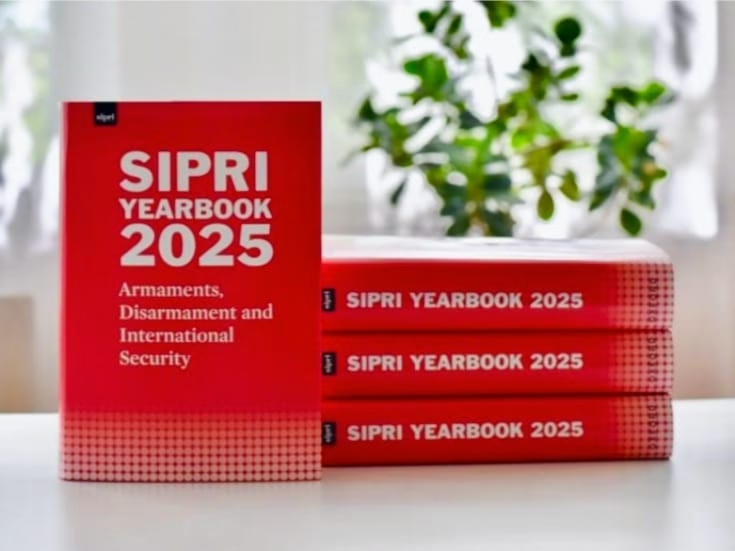The SIPRI Yearbook 2025 highlights a growing risk of nuclear conflict and a new nuclear arms race…
…..with weakening arms control frameworks . The yearbook provides an overview of developments in international security, military expenditure, arms production, arms trade, and weapons and technology .
the SIPRI Yearbook 2025 include:
- Global Nuclear Arsenals: At the start of 2025, the nine nuclear-armed states—the United States, Russia, the United Kingdom, France, China, India, Pakistan, North Korea, and Israel—possessed an estimated total of 12,241 nuclear warheads, with about 9,614 considered operationally available . Russia (5,459) and the USA (5,177) hold over 90% of the global warheads . Approximately 2,100 warheads are on high operational alert .
- Modernization: All nine nuclear powers are actively modernizing or expanding their arsenals .
- China’s Expansion: China’s nuclear arsenal has grown to 600 warheads, increasing by about 100 per year since 2023, and it has developed around 350 new intercontinental ballistic missile (ICBM) silos . China may also be shifting to keeping warheads mounted on missiles in peacetime .
- India and Pakistan: India’s nuclear warhead count increased to 180 as of January 2025, exceeding Pakistan’s estimated 170 . India is also developing new nuclear delivery systems, including canisterized missiles capable of carrying multiple warheads, and has a mature nuclear triad . Pakistan is expanding fissile material production and developing new delivery systems, with its arsenal expected to grow .
- Arms Control Crisis: The New START treaty is set to expire in 2026, with no successor in sight, raising concerns about unregulated nuclear growth .
- Emerging Threats: The yearbook highlights that the use of AI, cyber warfare, quantum systems, and space assets is contributing to the fragility and unpredictability of nuclear deterrence . Regional tensions and misinformation warfare also increase the risk of miscalculation and accidental conflict .
The SIPRI Yearbook is a respected resource for policymakers and scholars, providing data and analysis on global security issues .
About SIPRI
SIPRI, the Stockholm International Peace Research Institute, is an independent international institute dedicated to research into conflict, armaments, arms control, and disarmament . Established in 1966, SIPRI provides data, analysis, and recommendations based on open sources to policymakers, researchers, media, and the public .
SIPRI’s vision is a world where sources of insecurity are identified and understood, conflicts are prevented or resolved, and peace is sustained .its mission includes:
- Conducting research on security, conflict, and peace .
- Providing policy analysis and recommendations .
- Facilitating dialogue and building capacities .
- Promoting transparency and accountability .
- Delivering authoritative information to global audiences .
Located in Stockholm, Sweden, SIPRI receives substantial annual funding from the Swedish Government and also seeks financial support from other organizations for its research . It is regularly ranked among the most respected think tanks worldwide .
SIPRI’s research covers a wide range of topics, including:
- Armament and disarmament .
- Weapons of mass destruction .
- Emerging military and security technologies .
- Dual-use and arms trade control .
- Conflict, peace, and security, with regional focuses on Europe and Asia .
- Peace operations and conflict management .
- Peace and development .
- Climate change and risk .
- Governance and society .
- Peacebuilding and resilience .
SIPRI year book disseminates its findings through various channels, including an active media and communications program, seminars and conferences, a monthly newsletter, and a renowned publications program, such as the annual SIPRI Yearbook . to read about world org click www.eminentnews.com



























